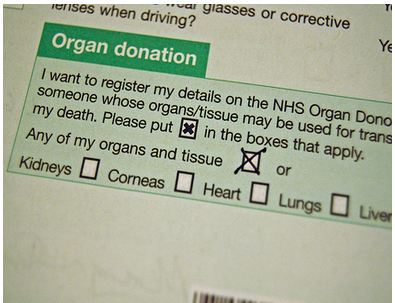How would you feel if you were told that your organs would be harvested unless you took the time to fill out a form? According to associate professor of surgery Dorry L. Segev at Johns Hopkins University School of Medicine, that is the dangerous perception that could follow with a presumed-consent organ donation system. A presumed-consent organ donation system would register every U.S. citizen as an organ donor from the time of birth and would ignore the family of the deceased’s requests to opt their loved ones out. A new study at Johns Hopkins University suggests that emplacing a presumed-consent organ donation system will have little to no effect on the amount of donors in the U.S. Supporters of a presumed-consent organ donation system may be in favor solely because they have the recipients in mind, but this system may not be the most logical way to go about attracting the spotlight on organ shortages.
Some people may see this approach as too aggressive or intrusive and could actually cause a backlash against the system, slowing donations to a minimum and thus countering the intended purpose of the policy. A valid issue discussed by John Fabre at The Guardian is that organ donors that are hospitalized for any medical purpose may question the effort put in by their medical team to be saved if there is a need for specific healthy organs that said patient possesses. While in truth, the medical team is working to their full capabilities, the doubt may still be in the patients mind.
Adopting a presumed-consent organ donation system is supported by personal experiences for some people, one example being New York assemblyman Richard Brodsky. His daughter was in desperate need of a kidney at the age of fourteen and had survived due to a successful transplant from another organ recipient, according to USA Today. If he succeeds in gaining presumed-consent organ donation in New York, families may no longer overrule their loved one’s request to donate their organs after death, contrasting to current policy. Any individual that does not opt-out of the system will have their organs collected at death, whether the family requests otherwise or not.
Every donor has the capability to save up to 8 lives, and other tissue recipient’s quality of life can skyrocket with donations of tendons, ligaments, veins, cartilage, heart valves, bones, skin, and even the cornea of the eye. There are people that have been waiting for multiple years in order to get an organ donation, and in many cases, that is more time than the recipient has to spare. Some sources say that there may be potential for this system to work in the United States as it has in multiple European countries such as Spain, where denial rates toward organ donation have declined to a mere 5-25% regionally.
An opt-out organ donation system has potential to gain advocation in the right conditions, but such an aggressive tactic is not necessary to achieve this goal. The right of self-determination – a basic bodily right – along with religious and cultural beliefs are conflicted with this method, which is not the case with the current “informed consent” tactic. Presumed-consent organ donation systems is comparable to giving every student a peanut butter and jelly sandwich for lunch. Eventually, a student with a peanut allergy is given his lunch, exposing a flaw in the lunch system and bringing dissidents into the light to speak their objections. These objectors are what bring the system down in flames. It is unfair to those with personal objections to be assumed to give consent without a single question being asked.
Although the presumed-consent organ donation method may have potential, there are a variety of other ways of gaining support for this worthy cause, such as fortifying the efficiency of organ transplants, utilizing public service announcements, social media trends, registration stations at public schools or even at blood drives. With a presumed-consent donation system, families of prospective donors can no longer deny the donation posthumously, regardless of their beliefs or feelings toward organ donation.
As every country is vastly different, one cannot make the assumption that presumed-consent organ donation systems would work as effectively in the U.S. as it would in European countries, especially with the great diversity of cultures in America. Referring to Spain’s records of organ donation rates, it is obvious to see that there was no significant increase in donation rates until over ten years after the policy was enacted, which may have been partially due to other efforts for the same cause.
As aforementioned, there are ways that you yourself can fight the issue of organ shortages for recipients without disregarding permission. Every donor has the capability to save up to eight lives and improve many others, as well as displaying your selflessness, your generosity, and your desire to help someone live after you have. Any individual with a drivers license or photo ID can register in minutes to be an organ donor if they so desire, and the benefit of doing so could most literally be a life.
Eliminate the Presumptions – Be an Organ Donor: Guest Editorial by Ben Knoebel
Read Time:4 Minute, 19 Second








